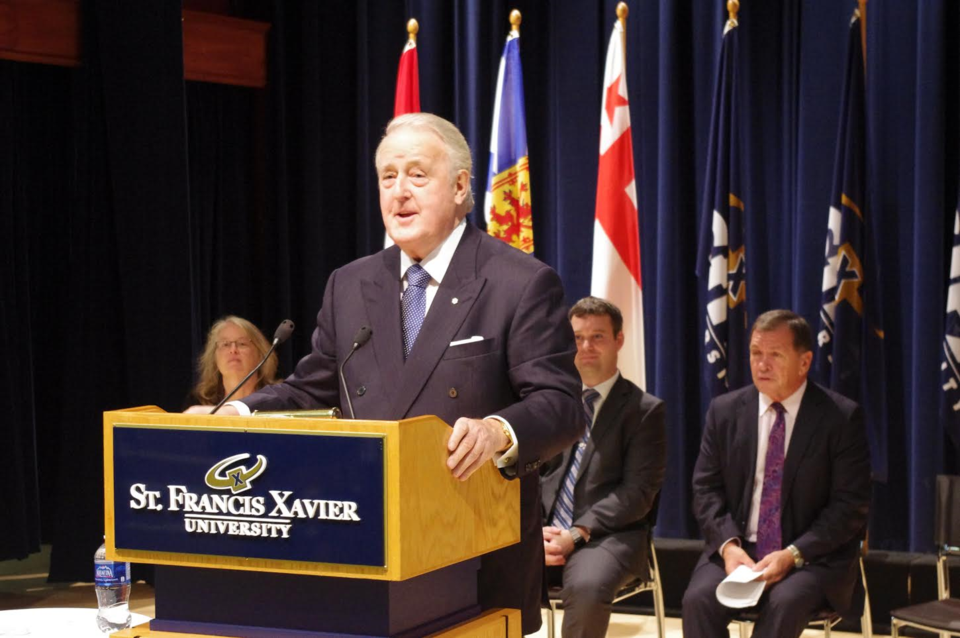THUNDER BAY – Prime Minister Justin Trudeau called former prime minister Brian Mulroney a statesman who will be deeply missed by Canadians from coast to coast.
Mulroney, who swept into power in 1984 and served until 1993, died on Thursday at 84.
Trudeau, in Thunder Bay for a housing announcement and a private party fundraiser, paid condolences to Mulroney’s family in a brief statement to media, and said the country’s 18th prime minister was committed to the country.
“He loved it with all his heart and served it many, many years in many different ways,” Trudeau said. “He had the courage to do big things, whether it was negotiating free trade with the United States and with Mexico, all the while standing up to protect Canada’s environment and pushed back against the Americans on acid rain, to stand strong on the international stage, standing up for Canada’s values against communism and authoritarianism and against apartheid.”
Born in Baie Comeau, Que in 1939, Mulroney first came to prominence as a Montreal labour lawyer. He finished third in the Progressive Conservative leadership race in 1976 and went into private business until 1983 as the president of the Iron Ore Company of Canada, a position he held until successfully winning the party leadership.
Mulroney’s government won the second largest percentage of seats in Canadian electoral history in 1984 and another majority four years later.
During his tenure, in addition to the North American Free Trade Act, Mulroney helped usher in the goods and service tax, privatized Crown corporations, including Air Canada and Petro-Canada, and pushed Quebec to endorse constitutional amendments, first in the Meech Lake Accord and later the Charlottetown Accord.
Neither attempt was successful.
Mulroney pushed for stronger relations with the United States, and was a vocal opponent of apartheid, the system of racial segregation in South Africa.
Even after Mulroney left office in 1993, he continued to hold sway in Canadian politics, and was able to overlook party lines when Trudeau came to office.
“He was incredibly generous and effective in advising me and our government and the renegotiation of NAFTA during some very challenging years,” Trudeau said.
“It was not just the advice and the strategic council he gave me and us, but was also active with his contacts as part of Team Canada to make sure that the messages on how important the friendship and relationship between Canada and the U.S. was, not just for Canada but for the U.S., to keep.”
Mulroney was torn, as a proud Quebecer and the leader of Canada, as separatism talk began to grow during his time in office, ultimately leading to the creation of the Bloc Quebecois.
It was that pride in Canada and its promise that shone through.
“He shaped our past, but he shapes our present and he will impact our future as well,” Trudeau said.
Indigenous Services Minister Patty Hajdu said she had the pleasure of meeting Mulroney a number of times, including during the NAFTA re-negotiations.
She fondly remembers advice he once offered up to her.
“He told me the worst day in government is going to be better than your best day in opposition, so enjoy every minute. He would give you these little gems of advice every now and then. I think Canada is much better off because of his service,” Hajdu said.
Opposition Leader Pierre Poilievre said despite working-class roots, Mulroney rose to extraordinary heights in business and politics.
“But it wasn’t electoral success that defined his career, it’s what he did with it,” the Conservative leader told CPAC.
“As prime minister he unleashed free enterprise. He crushed inflation. He signed one of the most important free-trade agreements in the history of the world with the United States that remains largely in place today. And on the world stage he stood firmly on the side of freedom and against communism.”
Correction: This story initially indicated the Conservatives won a minority in 1988, when in fact they won a majority.
